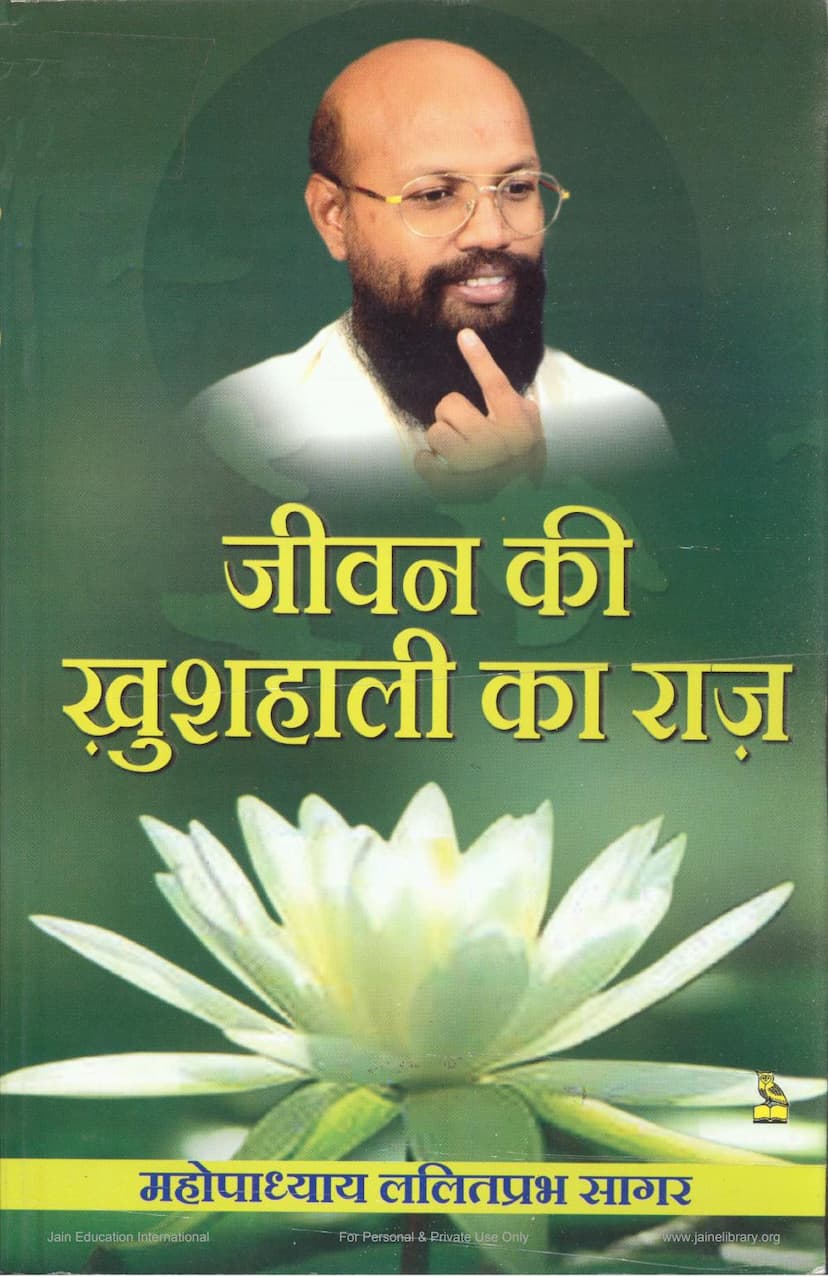Jivan Ki Khushhali Ka Raj
Added to library: September 2, 2025

Summary
Here's a comprehensive summary of the Jain text "Jivan ki Khushhali ka Raj" (The Secret to a Happy Life) by Lalitprabhsagar, based on the provided pages:
The book, "Jivan ki Khushhali ka Raj" (The Secret to a Happy Life) by Mahan Upadhyay Lalitprabhsagar, published by Pustak Mahal, offers profound insights and practical guidance on how to lead a truly happy, peaceful, and meaningful life. The author, a popular Jain monk known for his effective personality and inspiring discourse, aims to help readers navigate the complexities of modern life and find genuine contentment.
The book's core message is that true happiness is not derived from external possessions or achievements, but from within. It emphasizes the importance of cultivating a positive mindset, simple living, and ethical conduct to achieve lasting peace and fulfillment.
Key Themes and Principles Explored in the Book:
- The True Nature of Happiness: The book debunks the misconception that happiness is tied to material wealth or status. It argues that true happiness stems from inner peace, contentment, and a positive outlook, regardless of external circumstances. The author illustrates this by contrasting the outwardly successful but inwardly troubled wealthy individual with someone who may have little but possesses inner peace.
- Overcoming Worry and Anxiety: A significant portion of the book is dedicated to addressing the pervasive issue of worry and anxiety in modern life. The author explains that worry is a detrimental force that paralyzes individuals, hinders growth, and steals joy. He advocates for "thoughtful reflection" (chintan) over "worry" (chinta), urging readers to focus on present actions rather than dwelling on past regrets or future uncertainties.
- The Power of Positive Thinking and Acceptance: The book stresses the importance of adopting a positive mindset and accepting life's ups and downs with equanimity. It draws parallels to natural phenomena and historical anecdotes to illustrate how accepting adversity and finding lessons in challenges can lead to resilience and growth. The core idea is to embrace what happens as ultimately for the good.
- The Value of Simplicity and Inner Beauty: The author champions a "simple life, high thinking" philosophy. He advocates for shedding the obsession with external adornments and artificial beauty, emphasizing that true beauty lies in inner qualities like good thoughts, virtuous conduct, and a pure heart. This also extends to lifestyle choices, encouraging moderation and detachment from excessive materialism.
- The Significance of Righteous Conduct and Duty: The book highlights the importance of performing one's duties with integrity and dedication. Whether in a profession or personal life, honesty, commitment, and giving one's best are presented as pathways to self-respect and societal contribution.
- Nurturing Healthy Relationships and Friendship: The author provides detailed guidance on choosing and maintaining meaningful friendships. He emphasizes the profound impact of one's social circle on character and well-being, urging readers to be discerning in their associations and to prioritize friends who contribute positively to their lives. He also touches upon the importance of honest feedback and setting boundaries within relationships.
- Making Old Age Meaningful: The book addresses the later stages of life with wisdom and compassion. It encourages the elderly to view old age not as a burden but as an opportunity for reflection, guidance, and spiritual growth, leveraging their accumulated experiences. It stresses the importance of maintaining an active mind and engaging in meaningful activities.
- Cultivating Effective Behavior and Communication: The book delves into the art of presenting oneself effectively through refined behavior, thoughtful speech, and genuine kindness. It stresses the importance of aligning one's inner thoughts and outer actions, advocating for authenticity and politeness in all interactions. The power of polite language and positive affirmations is highlighted.
- The Foundation of a Happy Family: The author emphasizes that a truly happy family is built on love, mutual respect, understanding, and shared values, not just material possessions. He advises parents to lead by example, instilling good sanskars (values) in their children and fostering a harmonious environment where every member feels valued and supported. The importance of clear boundaries and gentle correction in child-rearing is also discussed.
- The Purity of Mind and Intention: A recurring theme is the necessity of a pure mind and sincere intentions. The book suggests that external religious practices are less impactful if the mind is clouded with negativity, greed, or malice. It encourages cultivating a clean heart and a positive, compassionate outlook.
- The Power of Inner Strength and Self-Reliance: The book promotes self-reliance and the development of inner strength to overcome life's challenges. It encourages readers to harness their inherent potential and face difficulties with courage, rather than succumbing to despair.
In essence, "Jivan ki Khushhali ka Raj" serves as a practical guide for spiritual and personal growth, offering timeless Jain principles adapted for contemporary life. It empowers readers to transform their lives by focusing on inner cultivation, ethical living, and harmonious relationships, ultimately leading to a state of lasting happiness and peace.